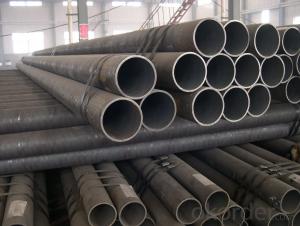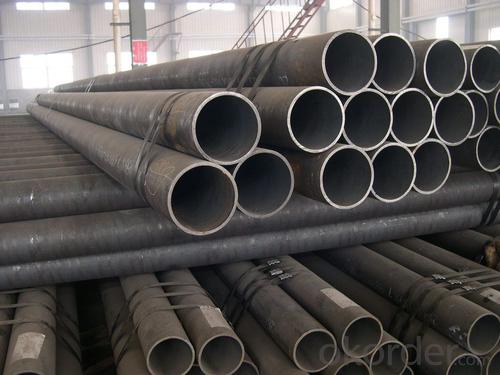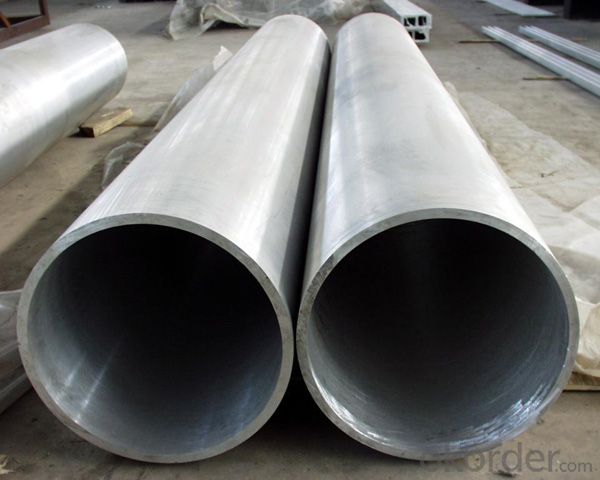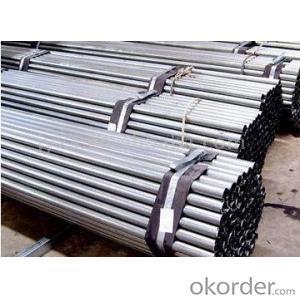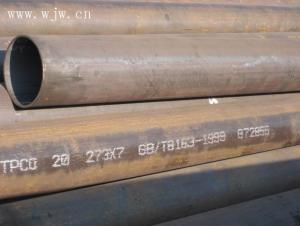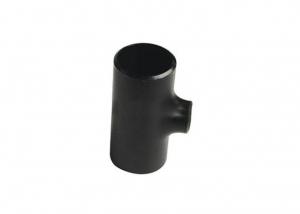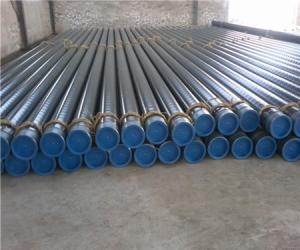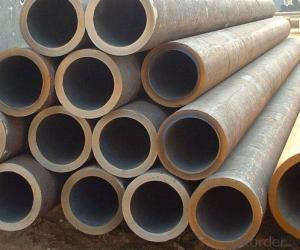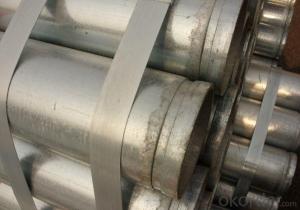Carbon Steamless Steel Pipe With Large OD
- Loading Port:
- Tianjin
- Payment Terms:
- TT or LC
- Min Order Qty:
- 25 m.t.
- Supply Capability:
- 9000 m.t./month
OKorder Service Pledge
OKorder Financial Service
You Might Also Like
1、Structure of Seamless Pipe ASTM A106/53:
Seamless pipe is formed by drawing a solid billet over a piercing rod to create the hollow shell. As the manufacturing process does not include any welding, seamless pipes are perceived to be stronger and more reliable. Historically seamless pipe was regarded as withstanding pressure better than other types, and was often more easily available than welded pipe.
Certification: ABS manufacturing assessment, ABS design assessment, API 5CT, API 5L, DNV manufacturer certificate, ISO9001 quality management system certificate, ISO14001 environment management system certificate, GB/T28001 occupational health and safety management system certificate, A1 class manufacturing license of special equipment certificate, CCS, GL, LR, SGS, TüV, PDE
Specifications:
Standard: API 5L
Grade: B, C, X42, X46, X50, X52, X56, X60, X65, X70, X80
OD: 1.5"-28"
WT: SCH10-SCH160
Length: 5-12m
Ends Finish: plain end, bevel end, grooved end
Surface Treatment: bare, black varnished, oiled finish, red color, anti-corrosion, 3PE, FBE or epoxy coating
Technique: hot rolled or cold drawn
Application: api 5l steel pipe for conveying oil, water, gas
Invoicing: based on theoretical weight or actual weight
Payment Terms: L/C at sight, T/T or Western Union
Trade Terms: FOB, CFR, CIF
2、Main Features of the Seamless Pipe ASTM A106/53:
• High manufacturing accuracy
• High strength
• Small inertia resistance
• Strong heat dissipation ability
• Good visual effect
• Reasonable price
3、Seamless Pipe ASTM A106/53 Specification:
Standard | GB, DIN, ASTM ASTM A106-2006, ASTM A53-2007 |
Grade | 10#-45#, 16Mn 10#, 20#, 45#, 16Mn |
Thickness | 8 - 33 mm |
Section Shape | Round |
Outer Diameter | 133 - 219 mm |
Place of Origin | Shandong, China (Mainland) |
Secondary Or Not | Non-secondary |
Application | Hydraulic Pipe |
Technique | Cold Drawn |
Certification | API |
Surface Treatment | factory state or painted black |
Special Pipe | API Pipe |
Alloy Or Not | Non-alloy |
Length | 5-12M |
Outer Diameter | 21.3-610mm |
Grade | 20#, 45#, Q345, API J55, API K55, API L80, API N80, API P110, A53B |
Standard | ASME, ASTM |
1) Material:20#(ASTM A 106/A53 GRB.API5LGRB,GB),45#,16Mn,10#.
2) Specification range:OD:21.3-610mm,WT:6-70mm,length:6-12m or according to the requirement of clients.
3) Excutive standards:GB,ASME API5L.ASTM A 106/A53,Despite of the above standards,we can also supply seamless steel pipe with standard of DIN,JIS,and so on,and also develop new products according to the requirements of our clients!
4) Surface:black lacquered,varnish coating or galvanized.
5) Ends:Beveled or square cut,plastic capped,painted.
6) Packing:bundles wrapped with strong steel strip,seaworthy packing.
4、Packaging & Delivery
Packaging Details: | seaworthy package,bundles wrapped with strong steel strip |
Delivery Detail: | 15-30days after received 30%TT |
5、FAQ of Seamless Pipe ASTM A106/53:
①How is the quality of your products?
Our products are manufactured strictly according to national and internaional standard, and we take a test
on every pipe before delivered out. If you want see our quality certifications and all kinds of testing report, please just ask us for it.
Guaranteed: If products’ quality don’t accord to discription as we give or the promise before you place order, we promise 100% refund.
②How about price?
Yes, we are factory and be able to give you lowest price below market one, and we have a policy that “ for saving time and absolutely honest business attitude, we quote as lowest as possible for any customer, and discount can be given according to quantity”,if you like bargain and factory price is not low enough as you think, just don’t waste your time.Please trust the quotation we would give you, it is professional one.
③Why should you chose us?
Chose happens because of quality, then price, We can give you both.Additionally, we can also offer professional products inquiry, products knowledge train(for agents), smooth goods delivery, exellent customer solution proposals.Our service formula: good quality+good price+good service=customer’s trust
SGS test is available, customer inspection before shipping is welcome, third party inspection is no problem.
6、Seamless Pipe ASTM A106/53 Images:
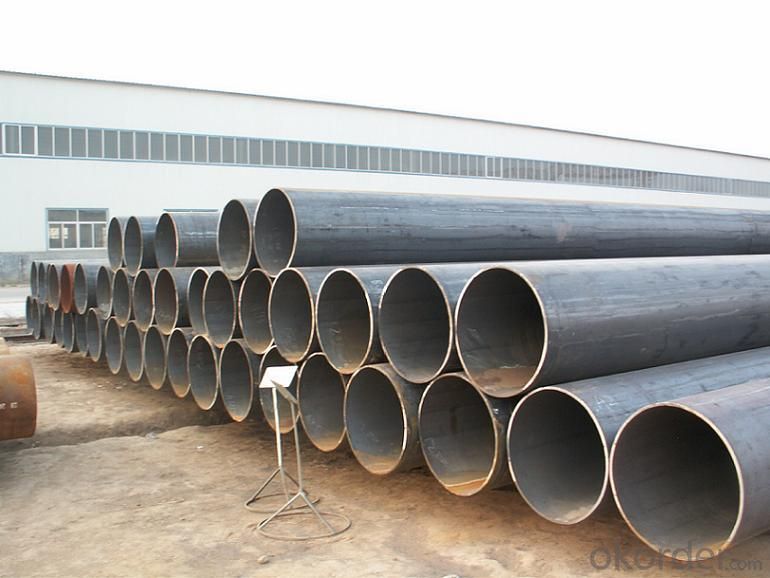
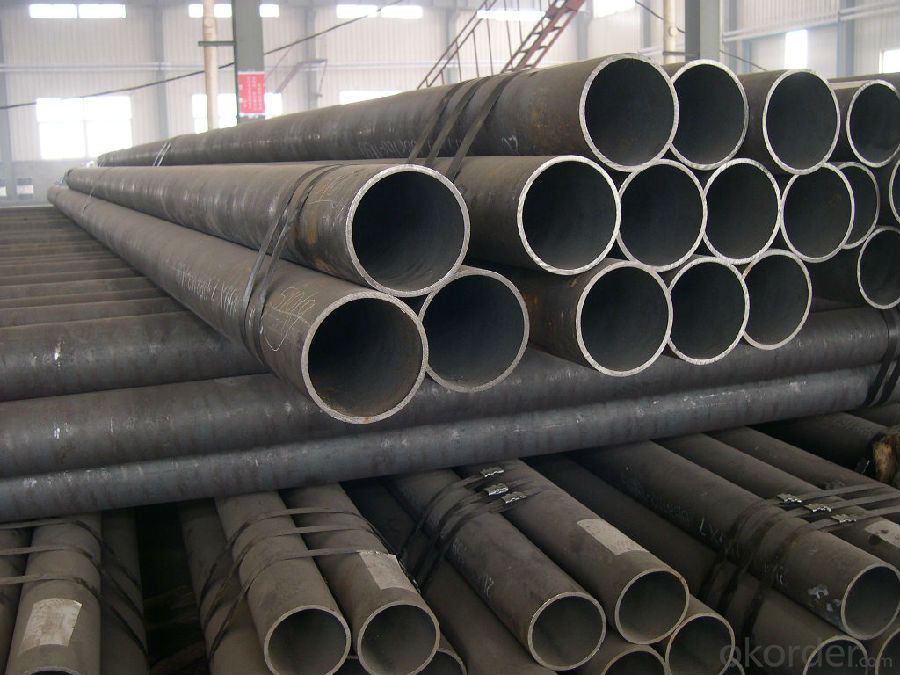
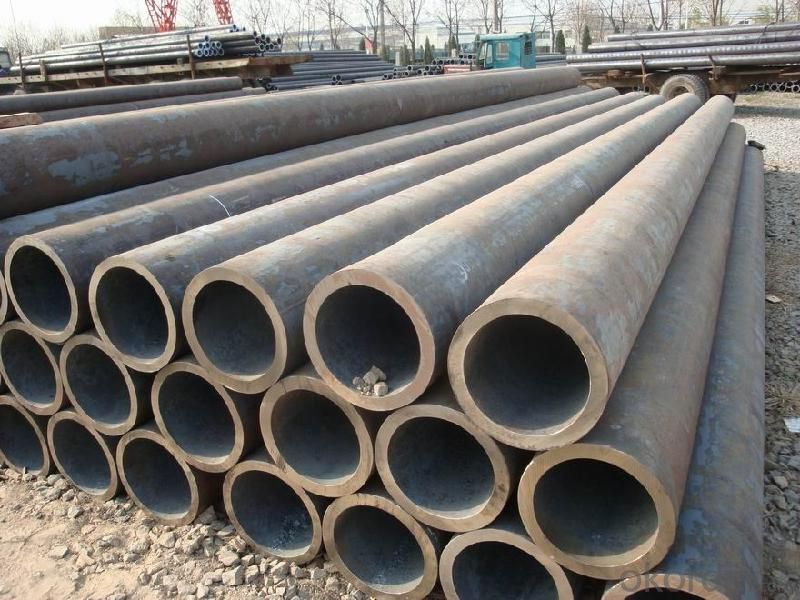
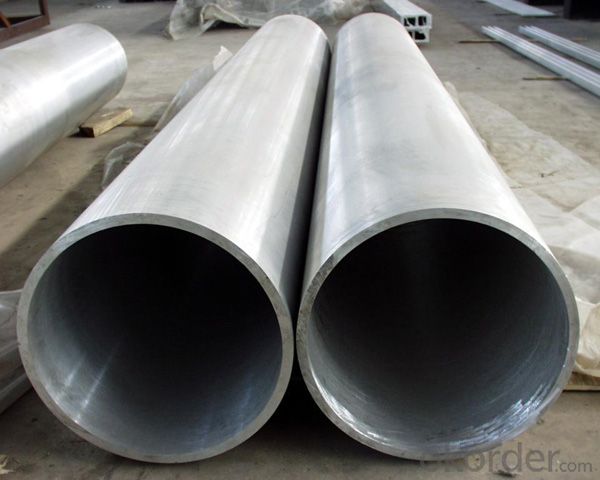
- Q: Can steel pipes be used for underground oil pipelines?
- Indeed, underground oil pipelines can utilize steel pipes. The construction of underground oil pipelines heavily relies on steel pipes owing to their robustness, longevity, and resistance to corrosion. They possess the capability to endure the immense pressure and weight exerted by the oil being transported, along with external forces like soil displacement or seismic events. Moreover, steel pipes can be fortified with coatings or linings such as epoxy or polyethylene, enhancing their resistance to corrosion and extending their lifespan. In conclusion, steel pipes emerge as a dependable and extensively employed option for underground oil pipelines.
- Q: How do you calculate the pipe volume for steel pipes?
- To calculate the pipe volume for steel pipes, you can use the formula V = πr^2h, where V represents volume, π is a mathematical constant (approximately 3.14159), r is the radius of the pipe, and h is the height or length of the pipe.
- Q: How much is 4 inches steel tube MM?
- The nominal diameter of the 4 inch steel pipe is DN100, that is to say, the diameter of the center of the pipe wall is 100mm.
- Q: What is the difference between black steel pipes and galvanized steel pipes?
- Black steel pipes are made of carbon steel and are typically used in gas or oil lines, while galvanized steel pipes are coated with a layer of zinc to protect against corrosion. Galvanized pipes are commonly used in plumbing systems and outdoor applications.
- Q: How are steel pipes used in irrigation systems?
- Steel pipes are commonly used in irrigation systems as they offer durability, strength, and corrosion resistance. These pipes are used to transport water from a water source to the fields or crops being irrigated. Their smooth interior surface allows for efficient water flow, and their high-pressure rating ensures that water reaches the desired areas with adequate force. Additionally, steel pipes are often used in underground irrigation systems due to their ability to withstand external pressures and protect the water supply from potential damage.
- Q: Are steel pipes suitable for fire protection systems?
- Yes, steel pipes are suitable for fire protection systems. They are widely used due to their durability, strength, and resistance to high temperatures. Steel pipes can efficiently transport water or fire suppressants to extinguish fires effectively, making them a reliable choice for fire protection installations in various buildings and industrial settings.
- Q: What quota should be installed for heating seamless steel pipe?
- Should be in low carbon steel welding installation set industrial pipeline engineering quota, material to input the name and type of seamless steel pipe specifications and price; according to the description of the contents of related items can be set.
- Q: What are the different methods of welding steel pipes?
- There are several methods of welding steel pipes, including arc welding, TIG (tungsten inert gas) welding, MIG (metal inert gas) welding, and oxy-fuel welding. Each method has its own advantages and applications, depending on factors such as the thickness of the steel, the desired strength of the weld, and the available equipment.
- Q: How does galvanization protect steel pipes from corrosion?
- Galvanization protects steel pipes from corrosion by forming a protective zinc coating on the surface of the pipes. This zinc coating acts as a barrier between the steel and the surrounding environment, preventing moisture and corrosive elements from reaching the steel. Additionally, if the zinc coating is damaged, it sacrificially corrodes before the steel, further protecting the pipes from rust and corrosion.
- Q: What are the different types of steel pipe supports for seismic applications?
- Some of the different types of steel pipe supports for seismic applications include sway braces, rigid braces, snubbers, and spring hangers.
Send your message to us
Carbon Steamless Steel Pipe With Large OD
- Loading Port:
- Tianjin
- Payment Terms:
- TT or LC
- Min Order Qty:
- 25 m.t.
- Supply Capability:
- 9000 m.t./month
OKorder Service Pledge
OKorder Financial Service
Similar products
Hot products
Hot Searches
Related keywords
